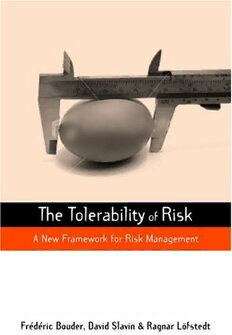Download The Tolerability of Risk: A New Framework for Risk Management PDF Free - Full Version
Download The Tolerability of Risk: A New Framework for Risk Management by Frédéric Bouder, David Slavin, Ragnar E. Löfstedt in PDF format completely FREE. No registration required, no payment needed. Get instant access to this valuable resource on PDFdrive.to!
About The Tolerability of Risk: A New Framework for Risk Management
The book provides a historical and topical perspective on the alternative concept of Tolerability of Risk and its concrete regulatory applications. In the UK, Tolerability of Risk has been developed into a sophisticated framework particularly within the health and safety sectors. It is expected to guide decisionmakers when applying their legal obligation of keeping risks as low as practically reasonable. Could Tolerability of Risk become a wider source of inspiration across the full scope of risk analysis and management?Written by leading academics and risk practitioners from industry and government, the book presents a summary of theoretical perspectives on risk approaches, provides a detailed elicitation of the methods and approaches used to build the Tolerability of Risk framework and looks at the prospect for universal application of the framework across a wide area of risk. From nuclear power to air and environmental pollutants to climate change to drug testing, this strategy may offer a workable, pragmatic solution for balancing risks against the costs involved in controlling them as well as in developing the institutional capacity to make effective decisions in all jurisdictions worldwide.The Tolerability of Risk is essential, cutting-edge reading for all academics, researchers, professionals and decisions makers working in the treacherous landscape of risk analysis, cost-benefit calculations, and risk reduction, management, and regulation.
Detailed Information
| Author: | Frédéric Bouder, David Slavin, Ragnar E. Löfstedt |
|---|---|
| Publication Year: | 2007 |
| ISBN: | 9781844076093 |
| Pages: | 159 |
| Language: | English |
| File Size: | 0.993 |
| Format: | |
| Price: | FREE |
Safe & Secure Download - No registration required
Why Choose PDFdrive for Your Free The Tolerability of Risk: A New Framework for Risk Management Download?
- 100% Free: No hidden fees or subscriptions required for one book every day.
- No Registration: Immediate access is available without creating accounts for one book every day.
- Safe and Secure: Clean downloads without malware or viruses
- Multiple Formats: PDF, MOBI, Mpub,... optimized for all devices
- Educational Resource: Supporting knowledge sharing and learning
Frequently Asked Questions
Is it really free to download The Tolerability of Risk: A New Framework for Risk Management PDF?
Yes, on https://PDFdrive.to you can download The Tolerability of Risk: A New Framework for Risk Management by Frédéric Bouder, David Slavin, Ragnar E. Löfstedt completely free. We don't require any payment, subscription, or registration to access this PDF file. For 3 books every day.
How can I read The Tolerability of Risk: A New Framework for Risk Management on my mobile device?
After downloading The Tolerability of Risk: A New Framework for Risk Management PDF, you can open it with any PDF reader app on your phone or tablet. We recommend using Adobe Acrobat Reader, Apple Books, or Google Play Books for the best reading experience.
Is this the full version of The Tolerability of Risk: A New Framework for Risk Management?
Yes, this is the complete PDF version of The Tolerability of Risk: A New Framework for Risk Management by Frédéric Bouder, David Slavin, Ragnar E. Löfstedt. You will be able to read the entire content as in the printed version without missing any pages.
Is it legal to download The Tolerability of Risk: A New Framework for Risk Management PDF for free?
https://PDFdrive.to provides links to free educational resources available online. We do not store any files on our servers. Please be aware of copyright laws in your country before downloading.
The materials shared are intended for research, educational, and personal use in accordance with fair use principles.

